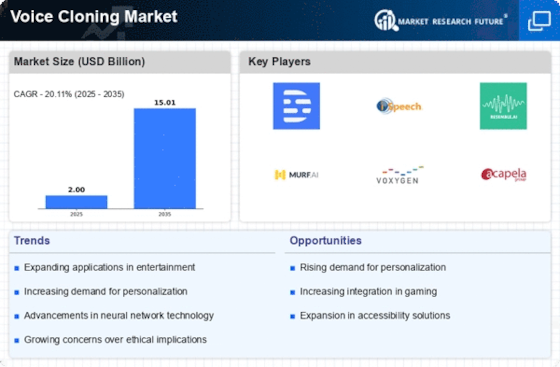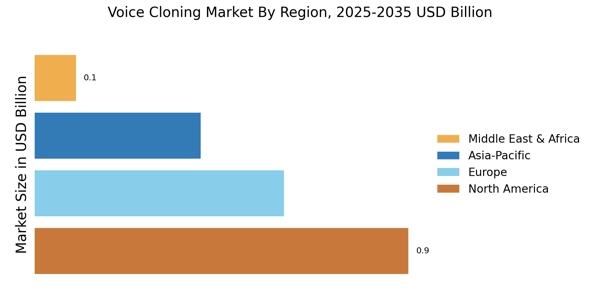Increased Adoption Across Industries
The Voice Cloning Market is witnessing increased adoption across diverse sectors, including entertainment, gaming, and telecommunications. Businesses are recognizing the potential of voice cloning technology to enhance user engagement and streamline operations. For example, in the gaming industry, developers are utilizing voice cloning to create more immersive experiences by providing unique character voices without the need for extensive voice actor involvement. Additionally, the telecommunications sector is leveraging voice cloning for customer service applications, allowing for personalized interactions that improve customer satisfaction. Market data indicates that the demand for voice cloning solutions in these industries is expected to rise significantly, with projections suggesting a market value exceeding several billion dollars by the end of the decade. This trend underscores the versatility and applicability of voice cloning technology across various domains.
Regulatory and Ethical Considerations
The Voice Cloning Market is also influenced by regulatory and ethical considerations that shape its development and application. As voice cloning technology becomes more prevalent, concerns regarding privacy, consent, and misuse are emerging. Regulatory bodies are beginning to establish guidelines to ensure responsible use of voice cloning, particularly in sensitive areas such as media and communications. This regulatory landscape may impact how companies approach voice cloning technology, potentially leading to increased investment in ethical practices and transparency. Market participants are likely to adapt to these evolving regulations, which could foster trust and acceptance among consumers. As the Voice Cloning Market navigates these challenges, the emphasis on ethical considerations may ultimately drive innovation and responsible growth.
Expansion of Voice-Enabled Technologies
The Voice Cloning Market is benefiting from the expansion of voice-enabled technologies, which are becoming integral to various applications. The proliferation of smart devices and virtual assistants has created a fertile ground for voice cloning solutions. As consumers increasingly rely on voice commands for tasks ranging from home automation to information retrieval, the demand for realistic and engaging voice interactions is surging. This trend is reflected in the growing number of companies integrating voice cloning technology into their products and services. Market data indicates that the voice-enabled technology sector is projected to reach a valuation of several billion dollars, further propelling the Voice Cloning Market. The seamless integration of voice cloning into everyday technology is likely to enhance user experiences and drive further adoption.
Growing Demand for Personalized Content
The Voice Cloning Market is driven by a growing demand for personalized content, which is becoming increasingly important in today's digital landscape. Consumers are seeking tailored experiences that resonate with their preferences, and voice cloning technology offers a unique solution to meet this demand. Businesses are utilizing voice cloning to create customized audio content, such as personalized messages, advertisements, and interactive voice responses. This trend is particularly evident in the marketing and advertising sectors, where brands are investing in voice cloning to enhance their outreach efforts. Market analysis suggests that the personalized audio content segment is likely to expand rapidly, contributing significantly to the overall growth of the Voice Cloning Market. As companies strive to differentiate themselves in a competitive marketplace, the ability to deliver personalized audio experiences will be a key driver of innovation.
Technological Advancements in Voice Cloning
The Voice Cloning Market is experiencing rapid technological advancements that enhance the quality and accessibility of voice cloning solutions. Innovations in artificial intelligence and machine learning algorithms are enabling more accurate and natural-sounding voice synthesis. For instance, the development of deep learning techniques has significantly improved the ability to replicate human intonations and emotions, making cloned voices more lifelike. According to recent data, the market for voice synthesis technology is projected to grow at a compound annual growth rate of over 20% in the coming years. This growth is driven by the increasing demand for personalized voice applications in various sectors, including entertainment, education, and customer service. As technology continues to evolve, the Voice Cloning Market is likely to witness further enhancements that could redefine user experiences.

















